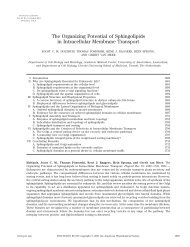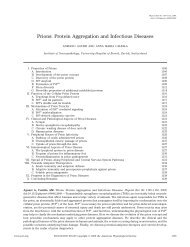Creatine and Creatinine Metabolism - Physiological Reviews
Creatine and Creatinine Metabolism - Physiological Reviews
Creatine and Creatinine Metabolism - Physiological Reviews
You also want an ePaper? Increase the reach of your titles
YUMPU automatically turns print PDFs into web optimized ePapers that Google loves.
July 2000 CREATINE AND CREATININE METABOLISM 1179<br />
water retention in the initial days of Cr supplementation<br />
(387, 442). Because the proportion of fat tended to decrease<br />
<strong>and</strong> lean tissue weight increased with Cr supplementation<br />
(209, 312, 510, 511, 952, 1040), the increase in<br />
body weight most likely reflects a corresponding increase<br />
in actual muscle mass <strong>and</strong>/or volume, a point that is<br />
particularly relevant for bodybuilders.<br />
Because the contribution of PCr hydrolysis to ATP<br />
regeneration is expected to be most relevant in (supra-)<br />
maximal exercise, in particular at the time when [PCr]<br />
normally becomes limiting (365, 386), a favorable effect of<br />
Cr supplementation on muscle performance is most likely<br />
in short-term high-intensity exercise. On the other h<strong>and</strong>, it<br />
is less evident how Cr supplementation should improve<br />
endurance performance. In fact, a variety of studies have<br />
shown an improvement in muscle performance upon Cr<br />
supplementation mostly in high-intensity, short-duration,<br />
repetitive exercise tests, but to some extent also in exercise<br />
tests of intermediate duration of 30–300 s (for reviews,<br />
see Refs. 441, 1106; see also Refs. 1, 225, 336, 583,<br />
627, 911, 913, 952, 1038, 1041). In series of 10 repeated 6-s<br />
bouts of high-intensity exercise on a cycle ergometer<br />
interspersed with 30-s passive rest periods, subjects were<br />
better able to maintain a pedal speed of 140 rev/min after<br />
a 6-day period of Cr supplementation (30 g/day) than after<br />
placebo ingestion (Fig. 19) (44). In a protocol of 6 � 6sof<br />
repeated cycle sprints departing every 30 s, Cr supplementation<br />
(20 g/day over 5 days) significantly increased<br />
total work completed over the six sprints, work performed<br />
in sprint 1, as well as peak power (162). In a<br />
series of two or three 30-s bouts of maximal isokinetic<br />
FIG. 19. Effect of Cr supplementation on muscle performance in 10<br />
6-s bouts of high-intensity cycling at an intended frequency of 140<br />
rev/min. Mean rev/min for the interval 4–6 s of each individual exercise<br />
bout are shown before (�) <strong>and</strong> after (■) 6 days of Cr supplementation.<br />
[Modified from Balsom et al. (44).]<br />
cycling, separated by 4 min of recovery, Cr ingestion at a<br />
rate of 20 g/day for 5 days significantly increased peak <strong>and</strong><br />
mean power output in exercise bout 1 as well as total<br />
work output in bouts 1 <strong>and</strong> 2, all by 4–8% (66, 113). The<br />
increases in both peak <strong>and</strong> total work production over the<br />
two exercise bouts in the study of Casey et al. (113) were<br />
positively correlated with the increase in muscle concentration<br />
of Cr plus PCr. Cr supplementation (20 g/day for 5<br />
days) increased the performance in a maximal continuous<br />
jumping test by 7% during the first 15 s <strong>and</strong> by 12% during<br />
the second 15 s (84). In the same study, Cr supplementation<br />
also improved the time of intensive running up to<br />
exhaustion in an all-out treadmill run lasting �60sby<br />
13%. Similarly, time to exhaustion of the leg at 80, 60, 40,<br />
<strong>and</strong> 20% of the maximum voluntary force of contraction<br />
(lasting �20–160 s) was significantly increased in resistance<br />
trained subjects by Cr supplementation (10 g/day<br />
for 5 days); in addition, Cr supplementation increased<br />
maximum voluntary force of contraction by �10% (583).<br />
In a study on a limited number of weight-trained subjects,<br />
performance in the Wingate bike test was improved 15–<br />
23% (209). Muscular strength, as evaluated by a one repetition<br />
maximum (1 RM) free weight bench press test,<br />
was increased 6.5%, <strong>and</strong> the number of lifting repetitions<br />
at 70% of the respective 1 RM load even by 35%. Body<br />
weight <strong>and</strong> calculated fat free mass were significantly<br />
increased by Cr supplementation in these weight-trained<br />
athletes despite a significantly lower daily energy, carbohydrate,<br />
<strong>and</strong> fat intake. No explanation is currently available<br />
for this latter finding. In resistance-trained men, Cr<br />
supplementation (25 g/day for 6 days) resulted in a significant<br />
increase in muscle performance during multiple sets<br />
of bench press (higher number of repetitions until exhaustion<br />
at 10 RM) or jump squat exercise (increased peak<br />
power output) (1068). In a protocol involving three interval<br />
series of 3 � 30, 4 � 20, <strong>and</strong> 5 � 10 maximal voluntary<br />
contractions of the knee extensors on an isokinetic dynamometer,<br />
with rest intervals of 2 min between series <strong>and</strong><br />
20–60 s between individual bouts, dynamic torque production<br />
was increased 10–23% after 6 days of Cr ingestion<br />
(0.5 g � kg �1 � day �1 ) (1039). This ergogenic action of Cr<br />
was, however, completely abolished by simultaneous caffeine<br />
intake, even though caffeine had no effect on the<br />
stimulation of Cr accumulation into muscle in response to<br />
Cr supplementation. In trials of 4 � 300-m or 4 � 1,000-m<br />
runs with 3- <strong>and</strong> 4-min rest intervals between repetitions,<br />
Cr supplementation (30 g/day for 6 days) significantly<br />
reduced the running times for the final 300-m or 1,000-m<br />
runs as well as the total time for 4 � 1,000 m (339). Best<br />
300-m <strong>and</strong> 1,000-m times in this series decreased significantly<br />
by 0.3 � 0.1 <strong>and</strong> 2.1 � 0.6 s, respectively. Cr<br />
supplementation (20 g/day for 5 days) significantly increased<br />
the work performed in three maximal kayak ergometer<br />
tests of 90-, 150-, <strong>and</strong> 300-s duration by 7–16%<br />
while having no effect on peak power (627). Finally, Cr











